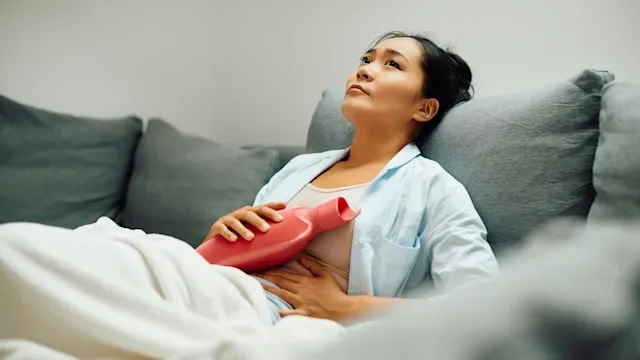Key takeaways:
Hypothalamic amenorrhea is a condition that causes your period to stop and can lead to health problems.
Stress, disordered eating, being underweight, and too much exercise are the main causes of hypothalamic amenorrhea.
Eating enough, choosing gentle exercise, and managing your stress can help you get your period back and reduce your risk of health complications.
Having your period may not be your favorite time of the month, but it is an important and healthy function. If you miss getting your period for several months and you are not pregnant, you may have a condition called hypothalamic amenorrhea.
This article will explain:
What hypothalamic amenorrhea is
Why it matters
What causes it
What you can do to help get your period back
What is hypothalamic amenorrhea?
Amenorrhea is a medical term for not having a period. It is not a disease, but it can be a symptom of other things going on in your body. There are different types of amenorrhea. In hypothalamic amenorrhea, your period may stop for several months because of changes in certain hormones that result from a problem with a part of your brain called the hypothalamus.
The hypothalamus helps control many parts of your body, including reproduction. It produces a hormone called gonadotropin-releasing hormone (GnRH). This hormone communicates with other hormones, such as estrogen, that are needed for reproduction. GnRH tells your body to produce a period if you are not pregnant. During hypothalamic amenorrhea, the hypothalamus stops producing GnRH.
What causes hypothalamic amenorrhea?
Some common causes of hypothalamic amenorrhea include:
Excessive exercise
Disordered eating habits
Significant weight loss
Being underweight
Sometimes, the cause may be a combination of these factors. Each of these things can put more stress on the body and keep it from doing what it needs to function properly. Stress of any kind can interfere with GnRH and can cause you to not get a normal period.
How common is hypothalamic amenorrhea?
About 3% to 5% of menstruating adults lose their period without being pregnant. About 20% to 35% of these may have hypothalamic amenorrhea. In America, it is estimated to affect 1.6 million menstruating adults between the ages of 18 and 44.
Who is most at risk for hypothalamic amenorrhea?
Your genetics play a role in how likely you are to develop hypothalamic amenorrhea. However, there are some factors that may place you at greater risk, such as:
Low body weight and body mass index (BMI)
Low body fat percentage (below 22%)
Not eating enough calories or fat for your body’s needs
Having an eating disorder
Being an athlete, or participating in intense exercise that causes you to burn more calories than you eat
Frequent mental and/or emotional stress
Read more like this
Explore these related articles, suggested for readers like you.
What are the symptoms of hypothalamic amenorrhea?
People with hypothalamic amenorrhea lose their period for 3 or more months, without being pregnant. This may be the only symptom for some people, but others may experience additional symptoms, including:
Mood disorders like anxiety and depression
Difficulty handling stress
Frequently feeling cold
Low energy
Vaginal dryness
Is hypothalamic amenorrhea serious?
Hypothalamic amenorrhea causes low levels of the hormone estrogen. Since estrogen plays many important roles in the body, this can create long-term problems.
If not addressed, hypothalamic amenorrhea can cause health problems, including:
Bone loss and osteoporosis
Increased risk for cardiovascular disease
Is hypothalamic amenorrhea reversible?
It is possible to recover from hypothalamic amenorrhea. The first step to getting your period back is to identify what may have caused it to go away in the first place. A healthcare provider can help evaluate your diet and lifestyle to determine what may have caused your condition.
Here are some steps you can take to help get your period back.
Evaluate your diet
Make sure you are eating enough calories for your body’s needs. You do not need to count calories, but should be eating at least three balanced meals each day, with snacks as needed. You may need to add additional snacks or increase the amount of healthy fats you eat from foods like:
Avocados
Olive oil
Coconut products
Cheese and full-fat dairy products
Nuts
Seeds and nut/seed butters
Reconsider your exercise routine
Exercise is good for you, but it can also be a form of stress on your body, especially if you are doing it often and at a high intensity. It may be necessary to cut back on how much exercise you do, and to try short bouts of gentle activities, like yoga, walking, and light cardio or resistance training, instead of more intense activities. It is important to do these activities only when you are well rested and properly fed.
Stress management
Stress can cause changes in your hormones that prevent you from getting a period. Making time for relaxation and self-care, and trying to get at least 7 to 9 hours of sleep each night, can help manage stress. You may also need to ask for help when you are overwhelmed and set boundaries with certain tasks or relationships.
Focus on your relationship with food and your body
Eating healthy is important, but it shouldn’t be an obsession. If you’re struggling with things like food rules, crash diets, and fear of weight gain, consider learning about and practicing things such as intuitive eating, which can help promote a healthier relationship with food. Working with a professional counselor or healthcare provider may also help.
The bottom line
If you’re not having a regular period, and you’re not pregnant or on contraception, this could be a sign that all is not right. It’s important to communicate with your doctor about whether you may have hypothalamic amenorrhea and to take steps to help you get your period back. A trained healthcare provider, like a dietitian or therapist, can provide a detailed evaluation of your lifestyle and provide further support.
References
Baker, E. R. (1985). Body weight and the initiation of puberty. Clinical Obstetrics and Gynecology.
ClinicalTrials.gov. (2008). The effect of GnRH on pituitary hormones in menstrual-cycle mood related disorders. U.S. National Library of Medicine.
Endocrine News. (2017). Endocrine Society issues hypothalamic amenorrhea guideline.
Eunice Kennedy Shriver National Institute of Child Health and Human Development. (2017). Amenorrhea.
Eunice Kennedy Shriver National Institute of Child Health and Human Development. (2017). What causes amenorrhea?
Kenealy, B. P., et al. (2017). Hypothalamic control of female reproduction. Oxford Research Encyclopedia of Neuroscience.
Meczekalski, B., et al. (2014). Functional hypothalamic amenorrhea and its influence on women’s health. Journal of Endocrinological Investigation.
Nakamura, Y., et al. (1984). Amenorrhea due to weight loss. Nihon Sanka Fujinka Gakkai Zasshi.
Sanders, R. (2009). Stress puts double whammy on reproductive system. UC Berkeley News.
Shufelt, C. L., et al. (2017). Hypothalamic amenorrhea and the long-term health consequences. Seminars in Reproductive Medicine.

Why trust our experts?



















